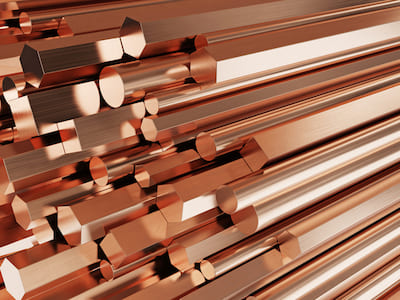Elevate Your Craftsmanship with High-Performance Copper Products for Artisans
Elevate Your Craftsmanship with High-Performance Copper Products for Artisans
Blog Article
Just How Copper Products Contribute to Lasting Practices in Different Fields
In renewable power systems, for instance, copper enhances the performance of solar and wind modern technologies, while its application in building and construction decreases waste through long life. As industries look for to embrace more sustainable methods, the duty of copper could show crucial in accomplishing environmental objectives.
Copper in Renewable Resource
Copper plays an important function in the development of renewable resource modern technologies, working as a crucial conductor in numerous applications. Its exceptional electrical conductivity and resistance to rust make it an ideal product for electric circuitry, which is essential in photovoltaic panels, wind generators, and power storage systems. In solar photovoltaic or pv systems, copper is made use of in the interconnections and circuitry, enabling reliable power conversion from sunlight to electricity.
In wind power, copper is important to the generators and transformers that convert kinetic power into electric energy, making sure optimal efficiency and dependability. The need for electrical cars (EVs) is increasing, with copper being a vital component in batteries, electric motors, and billing framework. The transition to EVs considerably improves the demand for copper, as these lorries usually utilize 4 times much more copper than conventional internal burning engine automobiles.
As the globe looks for to reduce environment modification and change to lasting energy sources, copper's role ends up being significantly essential. The material not just enhances the efficiency and toughness of eco-friendly power systems but also supports the broader objective of lowering greenhouse gas exhausts and promoting a sustainable future.
Eco-Friendly Building And Construction Materials
In recent times, there has actually been a remarkable shift in the direction of the adoption of green building materials in response to growing ecological concerns. This modification is inspired by the requirement for sustainable alternatives that reduce eco-friendly footprints while keeping architectural stability and visual allure.
Copper, recognized for its sturdiness and recyclability, has actually arised as a crucial player in this market. It can be made use of in roof, pipes, and electrical systems, contributing to energy effectiveness and lowering waste. Copper's longevity indicates less substitutes in time, further enhancing its sustainability account.
Furthermore, products such as bamboo, redeemed wood, and reused steel are acquiring appeal. These options not just offer lowered environmental influence yet also promote resource conservation. As constructing codes significantly stress sustainability, designers and builders are incorporating these materials into their tasks, cultivating advancement in design.
The boosting fostering of environmentally friendly construction products mirrors a broader commitment to sustainability in the built atmosphere. By focusing on these materials, the construction industry can substantially minimize its carbon impact, straighten with governing standards, and support a much healthier environment for future generations. This fad notes a crucial action in the direction of a much more sustainable future in building.
Copper's Function in Health care
Recent researches have highlighted the significant function of copper in medical care settings, particularly as a result of its antimicrobial residential properties. Copper surfaces have been revealed to lower the presence of pathogens, consisting of viruses and bacteria, by up to 99.9% within a short duration. This remarkable effectiveness makes copper an important material for high-touch surface areas in medical facilities, such as doorknobs, bed rails, and IV posts, thereby adding to boosted infection control measures.
In addition to its straight antimicrobial impacts, copper likewise contributes in the wider context of healthcare facility sustainability (Copper Products). By integrating copper right into clinical tools and link furnishings, healthcare centers can minimize the occurrence of healthcare-associated infections (HAIs), which not just improves client outcomes however likewise decreases the costs connected with extended medical facility keeps and extra therapies
Furthermore, copper's toughness and recyclability straighten with lasting practices, permitting for responsible resource administration. As healthcare systems increasingly focus on both patient safety and security and environmental stewardship, the integration of copper products is ending up being extra prevalent. This twin advantage emphasizes copper's essential contribution to a much healthier, more secure, and more lasting medical care environment.
Sustainability in Transport

Additionally, copper's toughness and corrosion resistance contribute to the long life of transportation infrastructure (Copper Products). In rail systems, for example, copper parts enhance the dependability and performance of signaling and power systems, crucial for minimizing delays and power usage. Furthermore, copper's role in renewable resource systems, such as solar and wind, supports sustainable transport remedies by offering clean power for electrical transportation alternatives
Investments in copper innovation not only foster sustainability but also boost economic growth and task development in green sectors. As industries make every effort to fulfill rigorous environmental laws, the application of copper products in transport arises as an essential strategy in attaining sustainability goals and promoting a cleaner, much more efficient future.
Copper and Round Economic Climate
As the globe increasingly accepts sustainability, the function of copper in the circular economic climate ends up being ever before more considerable. Copper's intrinsic properties-- such as its conductivity, sturdiness, official site and recyclability-- setting it as an navigate to these guys essential material in a resource-efficient economic climate. The round economic situation aims to reduce waste and optimize resource usage with recycling and reusing products, and copper excels in this regard.
The steel can be recycled forever without loss of high quality, making it an ideal candidate for sustainable practices across various markets, including building, electronics, and renewable resource. By recovering and recycling copper from end-of-life products, sectors can significantly reduce the demand for virgin materials, thus reducing environmental influences related to mining and handling.
Furthermore, the integration of copper right into round economic situation structures not just conserves sources yet additionally cultivates advancement. Businesses that prioritize copper recycling contribute to a much more lasting supply chain, enhancing their competition while straightening with regulative demands and customer preferences for eco responsible products.
Verdict
In verdict, copper products considerably contribute to sustainable practices throughout multiple fields. Their essential role in improving eco-friendly energy technologies, promoting environment-friendly building materials, supporting infection control in healthcare, helping with sustainable transportation, and embodying the principles of a circular economy underscores the convenience and importance of copper. By integrating copper right into numerous applications, markets can accomplish greater effectiveness, reduce ecological influence, and line up with global sustainability objectives, inevitably fostering an extra sustainable future.

Copper's superb conductivity makes it a preferred material in electrical lorry (EV) systems, enhancing energy efficiency and performance. In addition, copper's duty in sustainable energy systems, such as solar and wind, sustains sustainable transportation options by offering tidy power for electric transit options.
Their vital role in improving eco-friendly power technologies, advertising environment-friendly building and construction materials, supporting infection control in health care, facilitating lasting transport, and symbolizing the principles of a circular economic situation highlights the adaptability and significance of copper.
Report this page